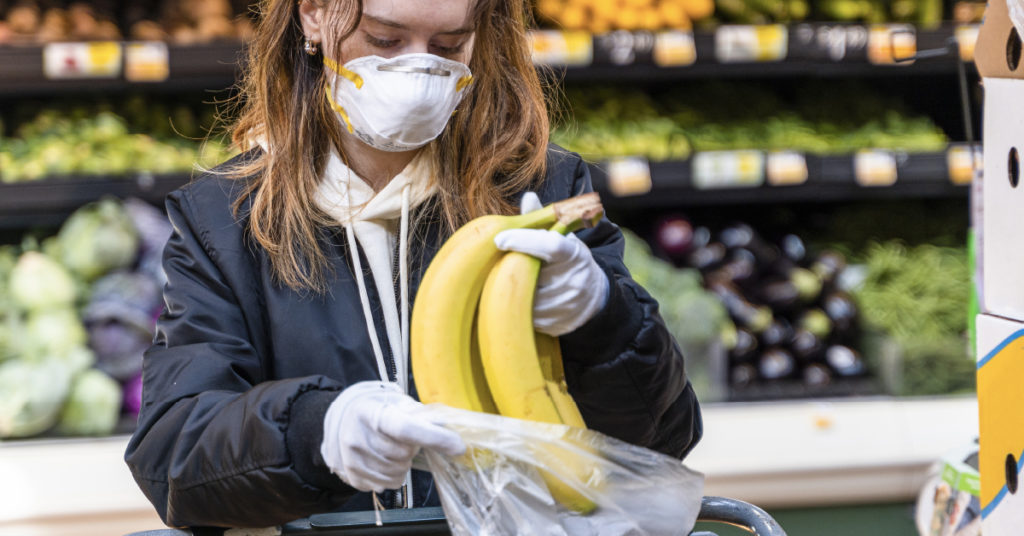
As we navigate these unprecedented times, a lot of families are wondering how to safely shop, store, and prepare food to minimize the transmission of Covid-19. To date, there isn’t any published evidence that you will get the virus from food packaging or touching food that came in contact with an infected person. However, the Food and Drug Administration reveals that coronavirus can survive on objects and surfaces for a certain amount of time. Because of this, we are advised to regularly wash our hands, especially after touching doorknobs, handles, or any frequently touched surfaces.
While it’s true that there is no specific evidence when it comes to dietary factors that can lessen the risk of contracting coronavirus, we are certain that being physically active, eating a healthy diet, getting enough sleep, and managing stress are very important things that will boost our immune system and contribute to our health and well-being.
In the face of uncertainties, we would like to share some important tips for storing and shopping for food.
Shopping for food:
- Use disinfecting wipes, alcohol, or a hand sanitizer on high-touch surfaces. This is especially true on door handles, bulk bin areas, cart handles, electronic pin pads, and checkout kiosks. And remember, even if you take the necessary precautions, it is still very important that you do not touch your face until you wash your hands.
- Shop during off-peak hours. It is ideal if you shop as soon as the store opens in the morning or late at night – maybe an hour before it closes.
- Avoid using cash. It notoriously dirty, even during the best of times. It is possible for coins and bills to transmit viruses, so it is best to avoid using them for now. If you cannot avoid using cash, do not forget to wash your hands thoroughly after. Yes, you are sensing a theme – regular handwashing is important!
- The Centers for Disease Control and Prevention recommends social distancing, and this means maintaining a distance of at least 2 meters or 6 feet from others. To gauge whether or not you are in the ‘safe zone,’ consider: one shopping cart is more than 3 feet long. Be sure to keep a two-cart distance between you and other people.
Food preparation and storage:
- Learn to understand the dates. Remember that the ‘best before’ date is about quality, and the ‘use by’ date is all about safety. After the ‘best before’ date, food is typically safe to eat, but the texture, taste, or smell might be affected. Do not eat food after the ‘use by’ date, even if it looks, tastes, or smells fine. It may make you sick.
- Wash fruits and vegetables, then blanch in boiling water for about a minute. Place them under cold running water immediately to deactivate the enzymes that cause food spoilage.
- Apples are a good example of fruits that can last for months in the fridge. More perishable fruits such as berries, bananas, cantaloupe, pineapple, and berries freeze well. Chop into bite-sized portions, place in an airtight freezer bag or container, and freeze.
- Cupboard storage. Dry, clean, and cool shelves are the best places to store dry food, bread, unopened jars, cans, or drinks. Produce that needs ripening, like avocadoes, bananas, tomatoes, and pears can be ripened at room temperature and away from direct sunlight.
- Refrigerate ‘high-risk’ foods. This includes poultry, meat, seafood, dairy, eggs, and cooked pasta and rice. Keeping them under 5 ° Celsius stops them from being in the danger zone – the temperature that provides a conducive environment for bacteria to multiply and grow. You might also want to consider freezing fish and poultry. Put them in an airtight freezer bag and label with the current date before freezing.
- Freeze to extend the foods’ ‘use by’ date. When freezing, be sure to use
appropriate packaging like plastic containers and sealed freezer bags. Here are
other freezing tips:
- Keep your freezer at or below -18 degrees Celsius.
- Do not refreeze thawed food. The quality of food deteriorates every time you refreeze them.
- Do not place hot foods straight to the freezer.
- Foods should be thawed completely before cooking.
To help food last longer, here are other important tips for storing food:
- Store dairy products at the back of the fridge where it’s coldest.
- To prevent oily residue from accumulating in your greens, stick paper towels inside the bag to help soak up excess moisture.
- Not all vegetables and fruits need to live in the fridge. Citrus fruits, bananas, onions, tomatoes, peaches, and potatoes can be stored in room temperature.
- If you buy grains in bulk, do not forget to put them in air-tight containers to maintain freshness.
- You may roast certain vegetables like cauliflower or broccoli to extend their shelf life.
- Wrapping celery in foil helps it stay crunchy and fresh for about 4 weeks in your crisper drawer.
- To prevent bananas from ripening quickly, cover its crown in plastic wrap to slow down the release of ethylene gas.
During this time, the potential for overbuying and food going bad is concerning. Remember that being prepared doesn’t mean hoarding or stockpiling. We suggest increasing your grocery haul, but try not to go overboard, especially when it comes to perishable items.
This is also a great time to experiment with new healthy recipes at home! Check out the Nutrition Source library of recipes.
Be safe. Be healthy. Be well.
- Dallas Dentist, Dr. Sarah Kong and Your Dallas Dental Wellness Family
Sources:
Food and Drug Administration: Frequently asked questions about COVID-19, FDA, https://www.fda.gov/emergency-preparedness-and-response/coronavirus-disease-2019-covid-19/coronavirus-disease-2019-covid-19-frequently-asked-questions.
“Interim US Guidance for Risk Assessment and Public Health Management of Persons with Potential Coronavirus Disease 2019 (COVID-19) Exposures: Geographic Risk and Contacts of Laboratory-confirmed Cases,” Centers for Disease Control and Prevention, 22 March 2020, https://www.cdc.gov/coronavirus/2019-ncov/php/risk-assessment.html.
“Safe Food Storage Tips,” Australian Institute of Food Safety, https://www.foodsafety.com.au/blog/safe-food-storage-tips.
“Freezer FAQs,” SafeFood, https://www.safefood.eu/Food-Safety/Storing/Freezers/Freezer-FAQs.aspx.
“Home Cooking,” Harvard School of Public Health, https://www.hsph.harvard.edu/nutritionsource/recipes-2/home-cooking/.
